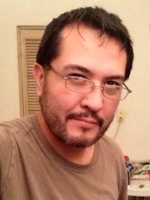Carlos Enrique Ibarra

PhD Candidate in Hispanic Linguistics
Department of Spanish and Portuguese
Biography
Carlos Enrique is interested in the intergenerational sociolinguistics of language maintenance, cultural and linguistic identity and attitudes, and usage domains in minority bilingual and trilingual communities within larger, dominant cultures and linguistic environments. He started studying this type of change in 2005 in Veneto communities in Guanajuato and Puebla, in central Mexico, and is interested in similar situations where other languages are in contact with varieties of Spanish, including French and Native American and Mexican languages. Some specific questions that he seeks to answer are related to what the correlations between cultural and linguistic identity and language, how cultural and linguistic identity manifests itself phonologically through generations within the same speech community, and how language use changes intergenerationally within families in a majority context that is linguistically different and dominant. Carlos Enrique is currently writing his dissertation on intergenerational linguistic identity, attitudes, usage, and language preservation among bilingual and trilingual Mixtecos in Woodburn, Oregon, hoping to graduate in Spring 2023.
Carlos Enrique has also taught all levels of college Spanish as a second language, and a few classes of English as a foreign language in higher education. He has also conducted research in segmental and suprasegmental phonological acquisition in formal classroom instruction. Furthermore, he has participated in institutional research projects at the University of Tennessee, Knoxville in 2001 and at the University of Florida in 2013 to understand and improve online Spanish learning by measuring student performance at the beginning and at the end of a semester by comparing scores of students in regular face-to-face classes with those of students taking the same class fully online and groups taking it in a hybrid, to find any statistically significant differences. He has collaborated in Spanish textbooks published by McGraw-Hill and Pearson. At the University of New Mexico, he has conducted research on the historical linguistics of Chihuahua and New Mexican Spanish, has researched sociophonetic and dialectal segmental production in speakers of Spanish as a Heritage language and has published and presented papers in conferences related to linguistic and cultural identity and attitudes in members of these speech communities, including a publication in a peer-reviewed journal with Professor Damian Wilson, Understanding the inheritors: The perception of beginning-level students toward their Spanish as a Heritage Language program (2015). At UNM, Carlos Enrique worked as Teaching Assistant in 2014-2015 for the program of Spanish as a Heritage Language, then became course supervisor in 2015-2017, and subsequently became Assistant Coordinator for that program 2018-2021, while teaching upper-division linguistics courses on Sociolinguistics and introduction to Hispanic Linguistics. Carlos Enrique attended the prestigious Newberry Consortium in American Indian Studies Summer Institute in Chicago in 2019 on a scholarship, organized with Professor Damián Wilson the 7th National Symposium on Spanish as a Heritage Language hosted by UNM in February 2020, and was a University of New Mexico Latin American and Iberian Institute 2020-2022 Ph D Fellow. He worked as the Spanish Language Program Coordinator at Louisiana State University in Baton Rouge in 2021-2022, and currently holds a visiting position in Sociolinguistics and Sociology at Fort Lewis College in Durango, Colorado.
Other interests include statistics for linguistics, suprasegmental acoustic perception, and production, sociophonetics, sociology of language, the preservation of native/indigenous Mexican and American languages, the pedagogical benefits of home variety use in the classroom, translanguaging, Spanglish, embodiment of semantics, Italian and French dialectology, Franglais, historical linguistics, and the use of native Mexican languages’ lexical borrowings in colonial literature. He is also interested in physics, game theory, self-organizing systems in sociology and economics, and mystic poetry.
